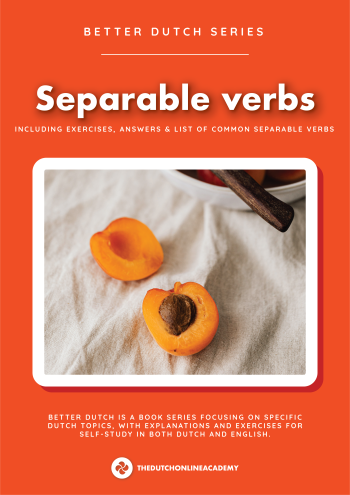Learn the theory
When learning Dutch, the third tense you normally learn after the present tense and the perfectum is the imperfectum.
In case you have doubt about when to use the perfect tense or the imperfectum, here we have an article about the differences between perfect and imperfect tenses in Dutch.
Let's get started!
What is the imperfect tense (het imperfectum)
Imperfectum in Dutch is not difficult. Let's look at the regular verb maken (to make):
- Ik maakte
- Jij maakte
- Hij/zij/het maakte
- Wij maakten
- Jullie maakten
- Zij maakten
How easy is this! You just have to remember two forms: singular and plural. Let's see how you make them.
How do you form the imperfect tense in Dutch?
- 1 - Find the stem by taking the full verb - en (maken - en = mak)
- 2 - Take a look at the last letter of the stem. Is this letter one of the consonants in PoCKeTFiSH?
- 3a - If it's in PoCKeTFiSH, you write -te behind the ik-form (maakte).
- 3b - If the letter is not in PoCKeTFiSH you write - de (belde).
- If the subject is plural, put a N behind it (maakten, belden)
So remember that PoCKeTFiSH (or SoFT KeTCHuP) is important for both the perfectum as the imperfectum in Dutch. You need this trick to check whether to write a D or a T.
How to deal with irregular verbs in imperfect tense?
It's easy and difficult at the same time: You need to remember them by heart! Just like in the perfect tense. Most verbs that are irregular in perfectum are also irregular in imperfectum.
Examples regular verbs in imperfectum
Let's look at some more examples of regular verbs first, so you can compare them with irregular verbs.
- Pakken (to take)
- Ik pak (present)
- Ik heb gepakt (perfectum, the K is in PoCKeTFiSH, so we write a T)
- Ik pakte (imperfectum, the K is in PoCKeTFiSH, so we write a T)
- Reizen (to travel)
- Ik reis (present)
- Ik heb gereisd (perfectum, the Z is not in PoCKeTFiSH, so we write a D)
- Ik reisde (imperfectum, the Z is not in PoCKeTFiSH, so we write a D)
As you can see, we've followed the rules we explained earlier. It's not that hard to form the imperfectum for regular verbs. Now let's move on to the irregular verbs in Dutch perfectum and imperfectum.
Examples irregular verbs in imperfectum
They don't follow the rules! That's why we call these verbs irregular. We've picked them out randomly, so you can see how different they can look.
- Gaan (to go)
- Ik ga (present)
- Ik ben gegaan (perfectum)
- Ik ging (imperfectum)
- Zingen (to sing)
- Ik zing (present)
- Ik heb gezongen (perfectum)
- Ik zong (imperfectum)
- Zijn (to be)
- Ik ben (present)
- Ik ben geweest (perfectum)
- Ik was (imperfectum)
- Lezen (to read)
- Ik lees (present)
- Ik heb gelezen (perfectum)
- Ik las (imperfectum)
- Zoeken (to search, to seek)
- Ik zoek (present)
- Ik heb gezocht (perfectum)
- Ik zocht (imperfectum)
- Vriezen (to freeze)
- Het vriest (present)
- Het heeft gevroren (perfectum)
- Het vroor (imperfectum)
Now, the above verbs are just some examples of irregular verbs. As you can see the vowel often changes when switching to imperfectum. This is not always the case. A verb an also look completely different, like you see in zijn (also irregular in present tense) or vriezen. You really have to learn them by heart. Invest time in this. Don't forget to expose yourself to Dutch conversations, radio and television, so you will develop an intuition for these irregular verbs. Here you find a podcast to practice the Dutch imperfectum.
You also have verbs that are semi-irregular. They are pretty rare. Here's an example:
- Bakken (to bake)
- Ik bak (present)
- Ik heb gebakken (perfectum)
- Ik bakte (imperfectum)
As you can see, the perfectum doesn't follow the SoFT KeTCHuP rule: it's irregular. But the imperfectum is regular.
Practice with exercises
Look at the verb in the brackets. Put the verb in imperfectum. R = regular verb, IRR = irregular verb.
Some ideas to keep learning
In case you are in doubt about when to use perfectum or imperfectum, here we have an article about the differences between perfect and imperfect tense in Dutch.
comments
Login to leave a comment


![Learn Dutch with The double infinitive in Dutch [list of auxiliary verbs included]](https://images.ctfassets.net/f8l4gy5qxe00/7fpaN2iBE3h1xS7LRL8c0h/3bbebedc080cbf7eece73424c8e3918f/The_double_infinitive.png?w=350&h=495&q=50&fm=png)
